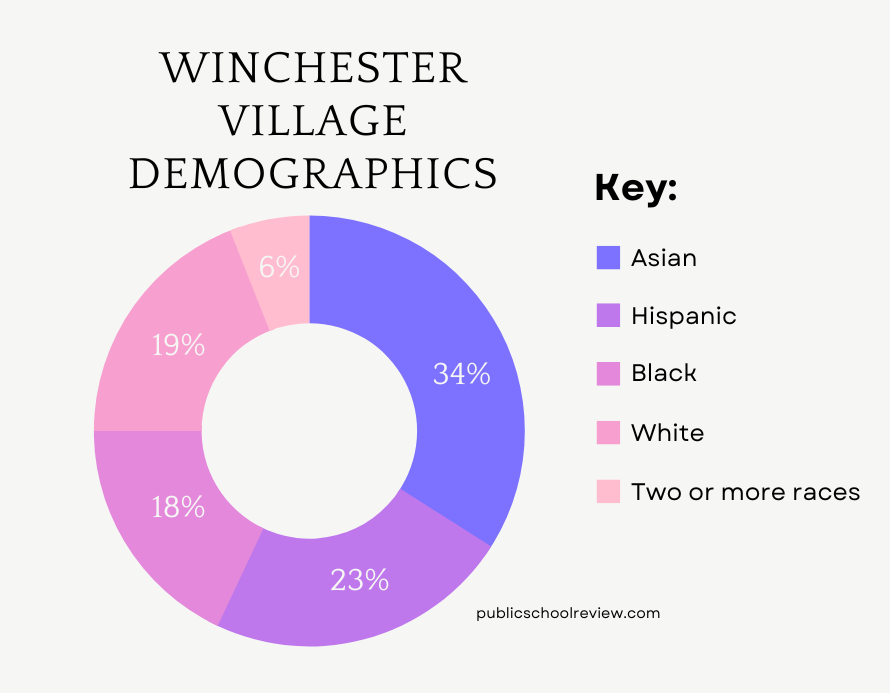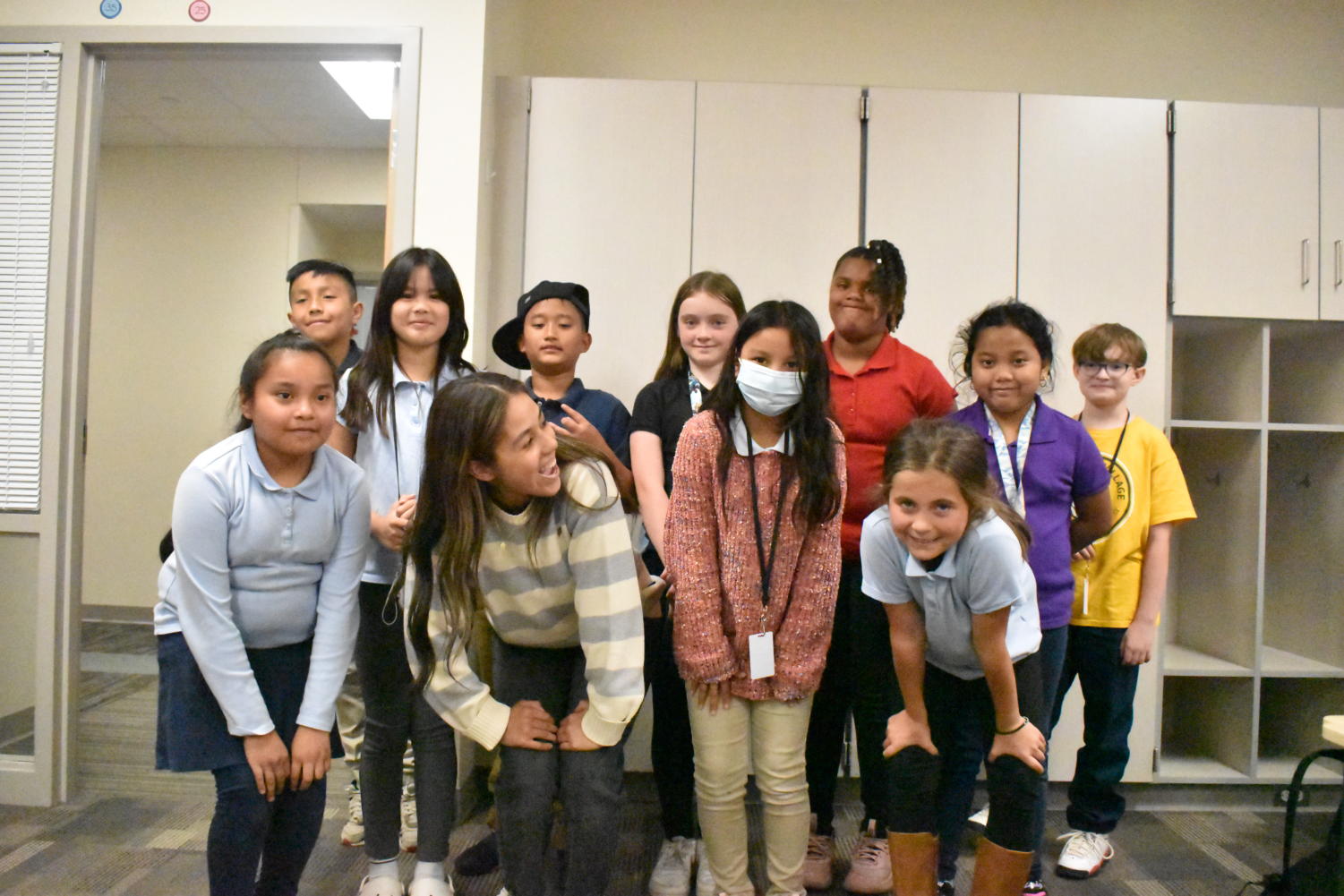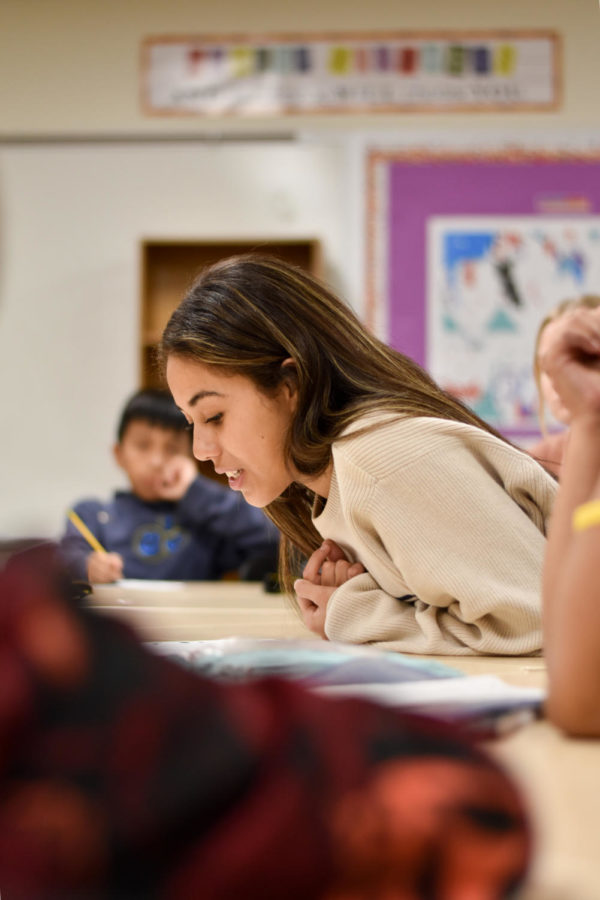Senior Dariely Raudales helps a student with his math homework on Oct 26. She helped students through their language barrier.
A helping hand
Senior gives back to English learners at Winchester Village through National Honor Society program
November 4, 2022
English
A little girl sits in a room, looking around at all the familiar, yet so unfamiliar faces of different students. There are unknown words entering her ear and coming out the other. She feels alone and isolated, sitting in a room with many kids who don’t understand her.
That girl, Dariely Raudales, immigrated from Honduras in the second grade, speaking little to no English. As time passed, she became more comfortable and is now a senior at SHS, but she never forgot the feeling of being that confused girl in class.
As a senior, Raudales has become heavily involved at SHS. One of those involvements include National Honors Society, where she acts as treasurer and is required to start a service project.
Raudales wanted to seize this opportunity and do something greater than herself. She chose to start a program dedicated to helping students like her at Winchester Village Elementary that struggle with learning English.
“I was trying to come up with something to do that I was actually passionate about,” Raudales said. “I didn’t want to pick something just to do it.”

THE BACKSTORY
Raudales grew up in a Spanish-speaking household. She had immigrated only a week before her 8th birthday, and like her family, was not able to speak much English.
She recalls having to be in different classrooms than the other students. Throughout elementary school, the assignments she had were considered easier and usually required one-on-one help. Many students in her E.L. class didn’t speak Spanish, which caused her to feel lonely.
Her parents still expected her to get good grades in school and meet certain expectations. Raudales says her parents didn’t know how far to push her. Therefore, they just left her to try and learn on her own.
“[Parents] don’t really get to that level where they can understand what we’re going through and what we experience,” Raudales said. “It’s very hard since they are so set in what they experience.”
Raudales started learning English around second grade with the help of teacher Isa Valdivia, who she is still in contact with. Valdivia started off in the district being a half-day E.L. teacher at Southport Elementary and at Winchester Village. The school district decided to move her to Winchester Village full time after a sudden uprising in E.L. students.
She helped Raudales with her English grammar and vocabulary. As Raudales picked up the language, Valdivia began to help her with school assignments. Due to Raudales learning English quickly, she didn’t work with Valdivia for long. But, Valdivia knew she had a bright future ahead.
“[I thought she was] very smart because she learned how to speak English in less than a year,” Valdivia said. “She’s smart. She’s so smart. I knew she was going to be a big person.”
Although Raudales had trouble, her mom Velkis Lanza, was there to keep her on track. If her daughter ever had homework, she would make sure that it got done.
Learning English has always been a goal for Lanza. She already knew a little English and was quickly determined to know more after coming to the U.S. Back in her home country, she worked as a hairstylist. To be able to continue her career and to learn the language more, she applied to American salons.
While working, she applied to C9 to earn her GED and be able to further her education. Lanza had always encouraged Raudales to do something with herself and not just sit around.
Raudales got the inspiration for the program when her two younger cousins immigrated to the U.S. and started to attend Winchester Village. One cousin had been picking up English pretty quickly, while the other was still having trouble. This, and memories from her childhood, in school made her want to start to plan a program that would help kids overcome their language barrier just as she did.
THE PROGRAM

The program takes place at Winchester Village from 2 to 2:30 p.m. on Wednesdays. In that time, Raudales completes activities with the students. She also uses this time to help students with homework and give them the support they may not have at home.
She thought this would be a good opportunity to give back to the school that helped her learn English and also aid students who were in the same situation she used to be in and that her cousins are in now.
They had to find a sponsor to approve the idea. Raudales managed to get NHS adviser Christina Ferguson to fill that role.
The program currently consists of 10 fourth graders, some who already know English and others that still have trouble.
When Raudales talked to Winchester Village Principal Blair Schneider, she made it clear she didn’t want to only help kids that speak Spanish.
“I didn’t want it to just be Hispanic kids,” Raudales said. “I know Asian people also have a language barrier.”
From the first meeting of the tutoring program, the kids warmed up to Raudales, following instructions and listening to what she had to say. Many of the students felt comfortable with her and each other.
“I love her. She’s really nice, really sweet,” fourth grader Biaktha Sung said.
Raudales is not alone in tending to the students. Her friend, senior Sydney Young, is there to help her. Young remembers hearing about Raudales, but never knew her until this year and they quickly became friends. She says hearing about the program made her like Raudales even more.
Though she joined to help Raudales, Young mostly wanted to help with the program because she wanted to be a part of supporting the kids.
“In elementary school, I just struggled,” Young said. “I would often just miss my parents a lot. I would cry a lot, and being able to see these kids enjoy their time at an elementary school and being able to help them with homework or just have fun with them means a lot.”

Throughout Raudales’s time in planning and starting up the program, she has left an impact on even those outside of it. One example of this is her influence on Lanza. She says she is very proud that Raudales has taken a step to help these kids who need it.
She understands the struggles that Raudales had as a child and knows that they weren’t unique to her.
“There’s a lot of families, not only in this state, in many states, that are limited (and) that have this problem,” Lanza said. “Their children have bad grades because their parents don’t know how to help them with their homework. It really makes me happy that she can help others.”
But Lanza isn’t the only one who sees the positive impact that this program will have on these students. Ferguson thinks this will benefit those on both sides of the program.
“I think it’s a great opportunity for the students to serve in the elementary schools,” Ferguson said. “And I think the elementary schools could greatly benefit from high school students who are willing to help.”
Even though this has just started up, Raudales is already thinking about what the future may look like.
She understands that it will be hard to keep it going if someone is not there to continue it next year, but she hopes to keep it going until at least the end of this year.
She hopes to find another volunteer to be in charge and continue it so that more people will be able to benefit from the program.
Even if it doesn’t continue, Raudales hopes she was able to help the kids to have a different experience than she did.
“I understand them, and I feel for them…,” Raudales said. “I hope that I help them in a way that they will feel comfortable and not feel some sort of anger towards themselves. We’re all different … and to not compare themselves to other people because (they are) all different.”
Spanish
Una niña pequeña se sienta en una habitación, mirando a su alrededor a todos los rostros familiares, aunque tan desconocidos, de diferentes estudiantes. Hay palabras desconocidas que entran por su oído y salen por el otro. Se siente sola y aislada, sentada en una habitación con muchos niños que no la entienden.
Esa niña, Dariely Raudales, emigró de Honduras en segundo grado y hablaba poco o nada de inglés. A medida que pasó el tiempo, se sintió más cómoda y ahora es estudiante de último año en SHS, pero nunca olvidó la sensación de ser esa niña confundida en la clase.
En su último año, Raudales se ha involucrado mucho en SHS. Una de esas participaciones incluye la Sociedad Nacional de Honores, donde actúa como tesorera y debe iniciar un proyecto de servicio.
Raudales quería aprovechar esta oportunidad y hacer algo más grande que ella misma. Ella eligió iniciar un programa dedicado a ayudar a estudiantes como ella en la escuela primaria Winchester Village que tienen dificultades para aprender inglés.
“Estaba tratando de encontrar algo que hacer que realmente me apasionara”, dijo Raudales. “No quería elegir algo solo para hacerlo”.
LA HISTORIA DE FONDO
Raudales creció en un hogar de habla hispana. Ella había emigrado solo una semana antes de cumplir 8 años y, al igual que su familia, no hablaba mucho inglés.
Ella recuerda tener que estar en diferentes salones de clases que los otros estudiantes. A lo largo de la escuela primaria, las tareas que tenía se consideraban más fáciles y, por lo general, requerían ayuda individual. Muchos estudiantes en su E.L. la clase no hablaba español, lo que hizo que se sintiera sola.
Sus padres aún esperaban que ella obtuviera buenas calificaciones en la escuela y cumpliera con ciertas expectativas. Raudales dice que sus padres no sabían hasta dónde presionarla. Por lo tanto, simplemente la dejaron para que intentara aprender por su cuenta.
“[Los padres] realmente no llegan a ese nivel en el que pueden entender por lo que estamos pasando y lo que experimentamos”, dijo Raudales. “Es muy difícil ya que están tan concentrados en lo que experimentan”.
Raudales comenzó a aprender inglés alrededor del segundo grado con la ayuda de la maestra Isa Valdivia, con quien todavía está en contacto. Valdivia comenzó en el distrito siendo maestra de medio tiempo E.L. en la Escuela Primaria Southport y en Winchester Village. El distrito escolar decidió trasladarla a Winchester Village a tiempo completo después de un levantamiento repentino en E.L. estudiantes.
Ayudó a Raudales con su gramática y vocabulario en inglés. A medida que Raudales aprendió el idioma, Valdivia comenzó a ayudarla con las tareas escolares. Debido a que Raudales aprendió inglés rápidamente, no trabajó con Valdivia por mucho tiempo. Pero, Valdivia sabía que tenía un futuro brillante por delante.
“[Pensé que ella era] muy inteligente porque aprendió a hablar inglés en menos de un año”, dijo Valdivia. “Ella es inteligente. Ella es tan inteligente. Sabía que iba a ser una gran persona”.
Aunque Raudales tuvo problemas, su mamá, Velkis Lanza, estuvo allí para mantenerla encaminada. Si su hija alguna vez tuviera tarea, se aseguraría de que la hiciera.
Aprender inglés siempre ha sido un objetivo para Lanza. Ya sabía un poco de inglés y rápidamente se decidió a saber más después de venir a los EE. UU. De vuelta en su país de origen, trabajó como estilista. Para poder continuar su carrera y aprender más el idioma, aplicó a los salones estadounidenses.
Mientras trabajaba, aplicó a C9 para obtener su GED y poder continuar su educación. Lanza siempre había alentado a Raudales a hacer algo consigo misma y no quedarse sentada.
Raudales se inspiró para el programa cuando sus dos primos más jóvenes emigraron a los EE. UU. y comenzaron a asistir a Winchester Village. Un primo había aprendido inglés bastante rápido, mientras que el otro todavía tenía problemas. Esto, y los recuerdos de su infancia en la escuela, la hicieron querer comenzar a planificar un programa que ayudaría a los niños a superar la barrera del idioma tal como lo hizo ella.
EL PROGRAMA
El programa tiene lugar en Winchester Village de 2 a 2:30 p. m. los miércoles. En ese tiempo, Raudales realiza actividades con los alumnos. Ella también usa este tiempo para ayudar a los estudiantes con la tarea y brindarles el apoyo que tal vez no tengan en casa.
Ella pensó que esta sería una buena oportunidad para retribuir a la escuela que la ayudó a aprender inglés y también ayudar a los estudiantes que estaban en la misma situación en la que ella solía estar y en la que están sus primos ahora.
Tuvieron que encontrar un patrocinador para aprobar la idea. Raudales logró que la asesora del NHS, Christina Ferguson, ocupara ese puesto.
El programa actualmente consta de 10 alumnos de cuarto grado, algunos que ya saben inglés y otros que todavía tienen problemas.
Cuando Raudales habló con la directora de Winchester Village, Blair Schneider, dejó en claro que no solo quería ayudar a los niños que hablan español.
“No quería que solo fueran niños hispanos”, dijo Raudales. “Sé que los asiáticos también tienen la barrera del idioma”.
Desde la primera reunión del programa de tutoría, los niños se entusiasmaron con Raudales, siguieron instrucciones y escucharon lo que tenía que decir. Muchos de los estudiantes se sintieron cómodos con ella y entre ellos.
“La amo. Es muy agradable, muy dulce”, dijo Biaktha Sung, estudiante de cuarto grado.
Raudales no es el único que atiende a los estudiantes. Su amiga, la estudiante de último año Sydney Young, está allí para ayudarla. Young recuerda haber oído hablar de Raudales, pero nunca la conoció hasta este año y rápidamente se hicieron amigos. Ella dice que escuchar sobre el programa hizo que le gustara aún más Raudales.
Aunque se unió para ayudar a Raudales, Young principalmente quería ayudar con el programa porque quería ser parte del apoyo a los niños.
“En la escuela primaria, simplemente luché”, dijo Young. “A menudo extrañaba mucho a mis padres. Lloraría mucho, y poder ver a estos niños disfrutar de su tiempo en una escuela primaria y poder ayudarlos con la tarea o simplemente divertirse con ellos significa mucho”.
A lo largo del tiempo de Raudales en la planificación y puesta en marcha del programa, ha dejado un impacto incluso en quienes están fuera de él. Un ejemplo de esto es su influencia en Lanza. Ella dice que está muy orgullosa de que Raudales haya dado un paso para ayudar a estos niños que lo necesitan.
Ella entiende las luchas que tuvo Raudales cuando era niña y sabe que no fueron exclusivas de ella.
“Hay muchas familias, no solo en este estado, en muchos estados, que están limitadas (y) que tienen este problema”, dijo Lanza. “Sus hijos tienen malas notas porque sus padres no saben cómo ayudarlos con sus tareas. Realmente me hace feliz que ella pueda ayudar a otros”.
Pero Lanza no es el único que ve el impacto positivo que este programa tendrá en estos estudiantes. Ferguson cree que esto beneficiará a los de ambos lados del programa.
“Creo que es una gran oportunidad para que los estudiantes sirvan en las escuelas primarias”, dijo Ferguson. “Y creo que las escuelas primarias podrían beneficiarse enormemente de los estudiantes de secundaria que están dispuestos a ayudar”.
Aunque esto acaba de comenzar, Raudales ya está pensando en cómo será el futuro.
Ella entiende que será difícil mantenerlo en marcha si no hay alguien allí para continuarlo el próximo año, pero espera que continúe al menos hasta el final de este año.
Ella espera encontrar otro voluntario que esté a cargo y continuarlo para que más personas puedan beneficiarse del programa.
Incluso si no continúa, Raudales espera haber podido ayudar a los niños a tener una experiencia diferente a la que ella tuvo.
“Los entiendo y lo siento por ellos…”, dijo Raudales. “Espero ayudarlos de manera que se sientan cómodos y no sientan algún tipo de ira hacia ellos mismos. Todos somos diferentes… y no compararse con otras personas porque (son) todos diferentes”.
